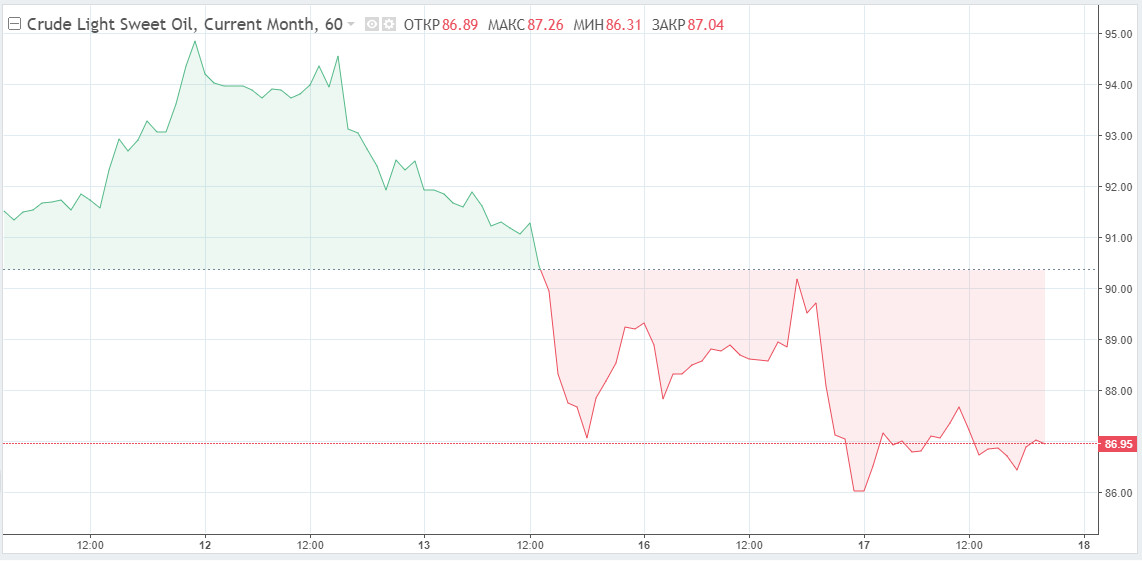
The price of oil is trying to recover huge losses at the beginning of Wednesday's trading session amid news of declining stocks in the US inventories. Later in the daytime trading, oil quotes do not withstand the pressure due to the release of weak macroeconomic statistics from the EU and the UK and very sparsely add positions on the chart under the onslaught of increasing expectations of a global recession.
October futures for Brent on London's ICE Futures exchange are at $92.58 per barrel on Wednesday, up 0.26% from the closing price of the previous trading session. The cost of futures for WTI oil for September in electronic trading on the New York Mercantile Exchange at that moment rose by 0.60% to $87.04 per barrel.

The American Petroleum Institute (API) released data on Tuesday night, which showed a decrease in oil reserves in the United States following last week's results. Inventories of raw materials fell by 448,000 barrels after a week earlier showed a clear increase of 2.156 million barrels. The official report on US energy stocks for the week ending August 12 will be released on Wednesday.
Macroeconomic data from Europe were released earlier Wednesday. Annual inflation in the UK in July accelerated to 10.1% (a month earlier this figure was at the level of 9.4%). At the same time, analysts expected an acceleration of only up to 9.8%. At the same time, GDP growth in the eurozone amounted to 3.9%, although analysts had predicted 4%.
Similar weakness in macroeconomic performance in Europe and the United Kingdom indicates a slowdown in global economic growth and the approaching recession. Analysts suggest that the most likely scenario for the development of the global economy in the near future is a significant recession lasting two quarters in a row.
And it is this fear of a recession, along with a lack of liquidity, that creates a negative background, which is why traders, fund managers and stock players simply exit the market.
Negotiations on Iran's nuclear program are still the main topic for investors today. It is known that in recent days progress has been made between the parties - the governments of Iran on one side and the United States and the EU on the other.
Analysts at the world's largest investment bank Goldman Sachs consider the possibility of resuming the nuclear deal in the near future extremely unlikely. At the same time, they are confident that even if the negotiations are successful, Iranian oil will fill the world market no earlier than 2023, or even much later.
As for forecasts of demand for oil, the new OPEC Secretary General Haitham Al-Ghais is very optimistic in this matter. In an interview with CNBC, he said that the demand for oil will definitely grow this year, in particular due to China and the high probability of gas consumers switching to oil. A large number of consumers in Europe are already switching to oil, Al-Ghais said. The same can be said about consumers in Asia and the Middle East.
The Secretary General of the cartel is convinced that one cannot ignore the restoration of air transportation, which will certainly return demand for oil to pre-Covid levels. OPEC expects demand for oil to return to pre-pandemic levels by the end of this year.
 English
English 
 Русский
Русский Bahasa Indonesia
Bahasa Indonesia Bahasa Malay
Bahasa Malay ไทย
ไทย Español
Español Deutsch
Deutsch Български
Български Français
Français Tiếng Việt
Tiếng Việt 中文
中文 বাংলা
বাংলা हिन्दी
हिन्दी Čeština
Čeština Українська
Українська Română
Română

